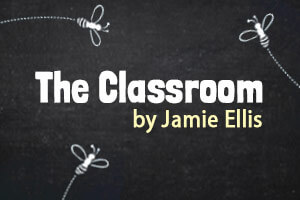
Email Questions to Jamie at classroom@americanbeejournal.com
Follow my lab on social media: Facebook Twitter Instagram
An introduction:
Greetings everyone. My name is Jamie Ellis and I am the new columnist for the American Bee Journal’s long running column “The Classroom.” As all of you dedicated readers know, this column was authored by Jerry Hayes for many years. Jerry is a personal friend of mine. We worked together in Florida when I was new to the University of Florida and he was the head of Apiary Inspection for the Florida Department of Agriculture and Consumer Services. I consider him a great colleague and a close friend.
Those of you reading Jerry’s column over the years know that he has a vast knowledge of the apiary industry across the U.S. He also has immense experience with practical beekeeping. Both of these attributes contributed to his long-running success at authoring this column. If I am not mistaken, he is the longest running contributor to “The Classroom” in the history of the American Bee Journal. That is a notable accomplishment for a man whose wisdom is so valued and contribution to the industry so appreciated. This is why I was excited for him when he shared with me that he accepted an offer to be the new editor at Bee Culture. I am confident Jerry will succeed at this new venture; he always has. I also continue to value his leadership and friendship. Good luck Jerry!
Shortly after Jerry and I discussed his impending departure from the American Bee Journal, Eugene Makovec (editor of ABJ) contacted me to gauge my interest in taking over “The Classroom.” I was immediately excited about this invitation. However, I was also a bit nervous. During my four years of authoring a column for the American Bee Journal (“Field Guide to Beekeeping” 2014 through 2017), I read “The Classroom” and “Letters to the Editor” in each issue of the journal. Readers frequently commented that “The Classroom” was their favorite column in the journal. Consequently, I know that readers expect this series to be informative and the answers given therein accurate, both of which Jerry Hayes made possible because he was, well, Jerry Hayes.
Thus, the “exciting” part to me is that I get to author a column again for the American Bee Journal. However, I am quite anxious about it because readers have come to know and love Jerry and highly value his insight into beekeeping. To me, it is like falling in love with a sitcom/movie and then having the main character replaced by someone else. Who liked “The Office” after Steve Carell left? Who liked any of the other individuals who played Batman after Michael Keaton stopped? And seriously, has there been a good James Bond since Sean Connery? See, now you know how I feel inheriting this column from such a beloved individual. This column will not be the same without Jerry. I am sure many of you are grateful for what he has done through “The Classroom” to help you with your beekeeping endeavors. Needless to say, I told Eugene “yes.” “The Classroom” is now mine to write. I hope to do this column justice.
So, who am I? I grew up in a rural area of east-central Georgia. I developed an interest in beekeeping when I was eight, but beekeeping was not in my family. Correspondingly, my parents were not that excited about letting me start working with an insect known for its painful sting. Despite this, I read everything I could on honey bees for the next four years. While in sixth grade, I had a teacher who was talking about bees in class one day. I mentioned that I was interested in getting my own colonies. She happened to have an uncle who was a beekeeper. She asked me if I would promise to keep bees if she would get me an empty hive. Unbeknownst to my parents, I said “yes” to my teacher. Shortly thereafter, that teacher showed up at my house with an empty bee hive. I guess my parents felt backed into a corner so they agreed to let me get bees.
It just so happened that my father had a work colleague who had been a beekeeper himself, but got out of beekeeping, giving all of his colonies to a friend of his. This friend-of-a-friend, Joe Miller, became my beekeeping mentor. I visited his house regularly for a year, working bees with him and taking notes feverishly. Mr. Miller died when I was 13 and I inherited his colonies and much of his beekeeping equipment. I knew no other beekeepers. I was alone, with my bees, on my grandparents’ dairy farm in Georgia.
I kept bees through middle and high school, learning what it took to keep bees alive and what stressors were guaranteed to kill my bees if I did not address them appropriately. I became a student of the bees. With no one else to teach me, I had to learn it myself. I read about bees and worked them every weekend. I did 4-H projects with bees, conducted science fair projects on bees, taught about bees, and sold honey at local farmers markets. I even had a small pollination job for a backyard blueberry grower. I was sufficiently hooked.
I was fortunate to cross paths with Dr. Keith Delaplane because of my various high school projects with honey bees. He had been particularly helpful with my 4-H and science fair projects. Given that background, he invited me to work in his lab at the University of Georgia during my four years as an undergraduate student at UGA. While there, I worked as a laboratory technician. I managed the research apiary, ….


